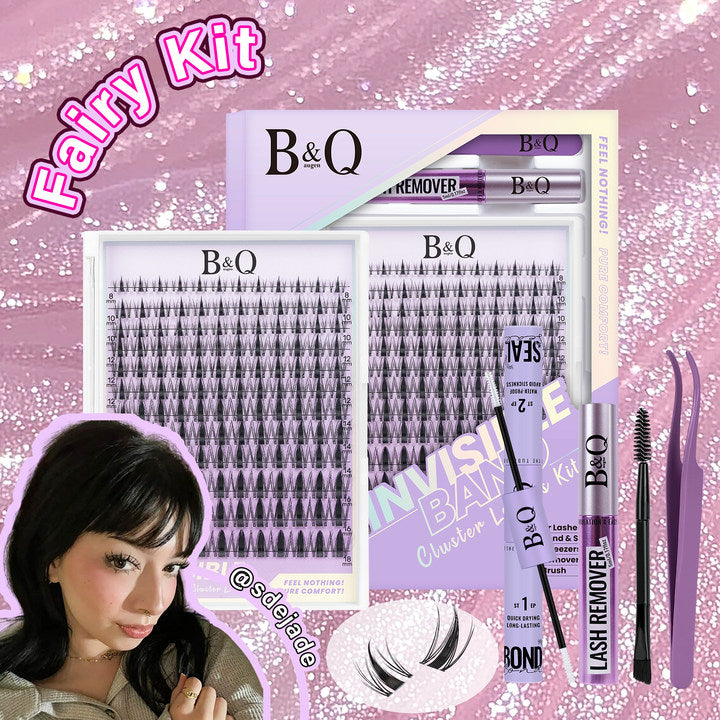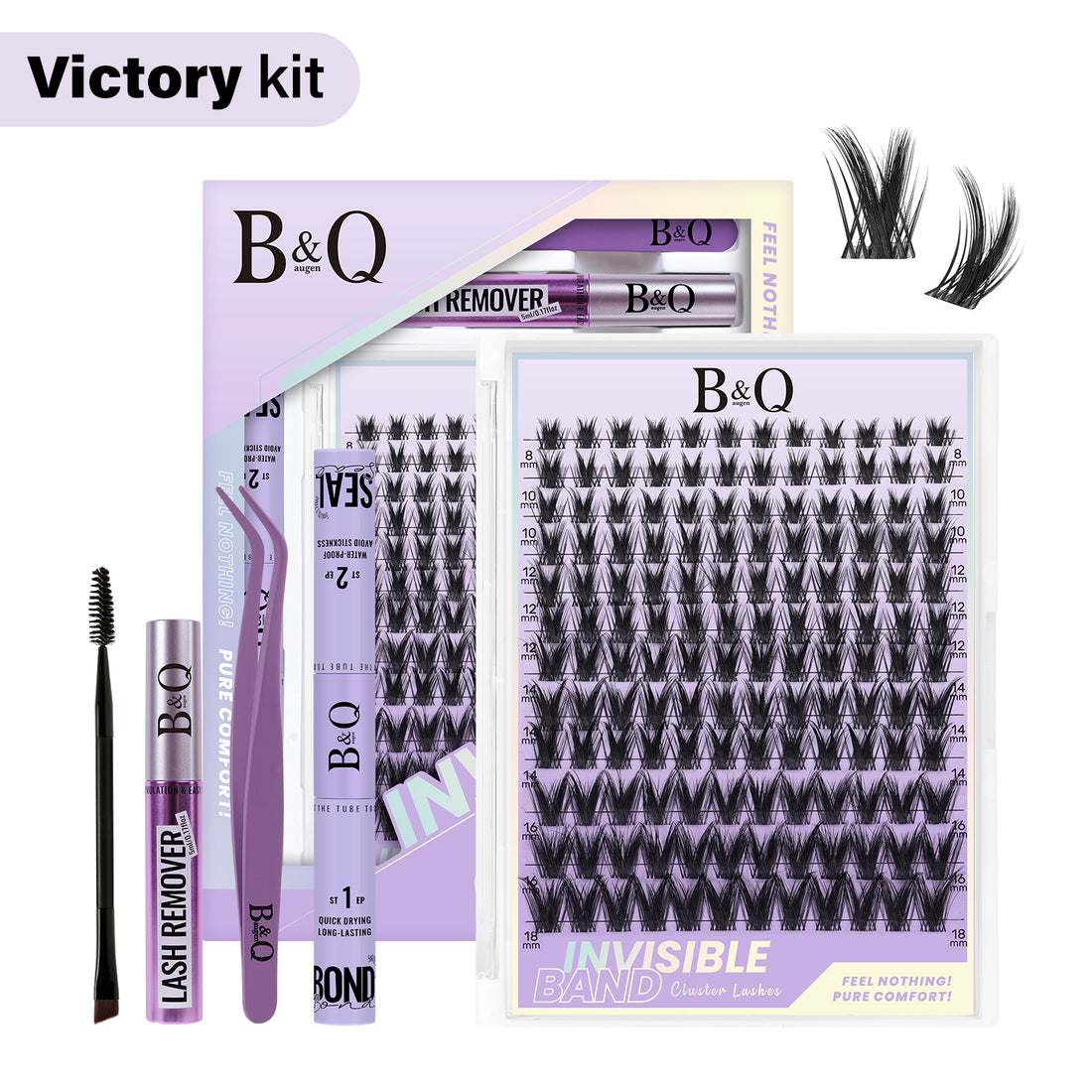We all do it — after a long day or a sleepless night, rubbing your eyes can feel incredibly satisfying. But here’s the truth: that brief moment of relief can do long-term damage, especially to your eyelashes. Whether you wear lash extensions, DIY cluster lashes, or simply love your natural lashes, rubbing your eyes is one of the most harmful habits for lash health.
In this article, we’ll explore what really happens when you rub your eyes, how it affects your lashes, and what to do instead to protect your delicate eye area.
1. The Delicate Structure of Your Lash Line
Your eyelashes aren’t just for beauty — they serve a biological purpose. Eyelashes act as natural barriers that protect your eyes from dust, debris, and bacteria. Each lash follicle is surrounded by tiny oil glands (called sebaceous glands) that keep your lashes hydrated and flexible.
However, this delicate system can easily be disrupted. Rubbing your eyes applies significant mechanical pressure to your lash follicles, potentially leading to inflammation, follicle damage, and premature lash loss. According to the American Academy of Ophthalmology (AAO), frequent rubbing can even contribute to trichotillomania-like lash loss, where lashes thin out due to repeated mechanical trauma.
When you rub your eyes, you’re not just touching your skin — you’re pulling on a structure designed for gentle protection, not rough contact.
2. Rubbing Your Eyes = Pulling Out Your Lashes
Let’s be honest: rubbing your eyes feels good because it stimulates pressure receptors and relieves irritation. But that friction also tugs at your lashes. Each lash is anchored by a follicle that takes six to ten weeks to fully regrow a new lash. If you repeatedly pull or break lashes, your lash cycle becomes uneven — some lashes will be short, others long, and overall volume will look thinner.
For those who wear DIY cluster lashes or lash extensions, rubbing is even more dangerous. The adhesive bonds that hold extensions or clusters in place are sensitive to both oil and friction. One good rub can loosen multiple clusters, cause uneven shedding, or make the extensions twist uncomfortably. That’s why lash artists always emphasize the rule: “Don’t touch your lashes!”
3. Rubbing Can Cause Follicle Inflammation and Lash Breakage
Your lash follicles sit just below the skin’s surface. When you rub your eyes aggressively, you’re not only risking lash fallout but also inflammation of the lash follicles — a condition known as blepharitis.
Blepharitis can cause itching, redness, burning, and lash thinning. Once inflamed, the follicles may produce weaker, finer lashes over time. Dermatologists note that repeated irritation can lead to miniaturization of lash follicles, a process similar to hair thinning on the scalp.
Over time, your lashes may start growing in irregular directions or stop regenerating as densely as before.
4. Eye Rubbing Accelerates Lash Aging
Just like the skin on your face, the area around your eyes is extremely thin — roughly 0.5 mm thick, which is about one-fourth the thickness of facial skin. Constant rubbing breaks down collagen and elastin fibers, leading to sagging skin and wrinkles (hello, crow’s feet).
But it doesn’t stop there: the skin damage can also weaken the environment around your lash follicles. A weakened base means less stable lash roots, making them more prone to falling out.
If you’ve ever noticed your lashes looking shorter or sparser as you age, part of that may be due to the micro-damage caused by daily rubbing — often done unconsciously when tired, stressed, or removing makeup.
5. How Rubbing Spreads Bacteria and Weakens Lash Health
Your hands come into contact with thousands of surfaces daily. Even if they look clean, they carry oils, bacteria, and dirt. When you rub your eyes, those contaminants transfer directly onto your lashes and eyelids.
This can lead to blocked oil glands, lash root infections, or styes (painful red bumps that form when a follicle becomes clogged or infected). Once that happens, your lashes in that area may fall out and take weeks to regrow.
In the long term, poor lash hygiene combined with constant rubbing can also lead to Demodex mite overgrowth — microscopic mites that live in lash follicles. While they’re usually harmless, excessive numbers can cause irritation and lash loss.
6. Why Eye Rubbing Is Even Worse for Lash Extension Wearers
If you’ve invested in eyelash extensions or use DIY lash clusters, rubbing your eyes can undo hours of application and waste your investment.
Extensions and DIY clusters are attached with cyanoacrylate-based glue, which forms a strong bond between your natural lashes and the synthetic fibers. This bond can be weakened by:
-
Oil from your hands
-
Friction from rubbing
-
Water or steam exposure
Once loosened, the lashes don’t fall out evenly — you’ll get patchy gaps that ruin the uniform look. Moreover, rubbing can also bend or crimp the extensions, giving them a messy, tangled appearance.
To make your lash extensions or clusters last longer, follow these rules:
✅ Avoid rubbing or pressing your eyes
✅ Use lint-free tools for cleaning your lashes
✅ Pat gently when drying your face
✅ Sleep on your back to avoid pressure on your eyes
7. How to Stop the Habit of Rubbing
Quitting the rubbing habit isn’t easy, especially if it’s something you do subconsciously. Here are a few practical ways to train yourself to stop:
-
Identify your triggers.
Do you rub your eyes when tired, stressed, or removing makeup? Awareness is the first step. -
Use a cool compress instead.
If your eyes feel itchy or puffy, apply a cool compress for 5–10 minutes. It relieves discomfort without damaging your lashes. -
Keep your lashes and lids clean.
Use a gentle, oil-free lash cleanser to remove dirt and residue daily. Clean lashes feel less irritated and reduce the urge to rub. -
Use lubricating eye drops.
Dry eyes often lead to rubbing. Artificial tears can hydrate your eyes safely. -
Switch to softer fabrics.
When drying your face, always pat gently with a soft towel — never rub. -
Be mindful of makeup removal.
Use a lash-safe remover and cotton swabs to dissolve eye makeup rather than wiping roughly.
8. Strengthen Your Lashes Instead
Protecting your lashes doesn’t just mean avoiding harm — it also means giving them the care they deserve. Consider these lash-friendly habits:
-
Use a lash serum with peptides and biotin to nourish follicles.
-
Brush your lashes daily with a clean spoolie to keep them neat.
-
Eat lash-loving foods like salmon, eggs, and leafy greens rich in omega-3s and vitamin E.
-
Take breaks between lash extensions to allow your natural lashes to recover.
Healthy lashes are resilient lashes — and they’ll stay that way if you stop the damage caused by rubbing.
9. The Bottom Line
Eye rubbing may seem harmless, but it’s one of the biggest culprits behind lash loss, breakage, and follicle damage. Over time, it can even change the way your lashes grow and make your lash line look thinner or patchy.
Your eyes and lashes deserve gentle care. The next time you feel that irresistible urge to rub your eyes, pause and remember: every rub counts — and not in a good way.
Protect your lashes today, and they’ll reward you with the fullness and beauty you love tomorrow.
Sources
-
American Academy of Ophthalmology (AAO) – Why You Shouldn’t Rub Your Eyes
-
Mayo Clinic – Blepharitis: Symptoms and Causes
-
Journal of Ophthalmology (2020) – Mechanical Effects of Eye Rubbing on Ocular Structures
-
American Optometric Association – Eyelid and Eyelash Hygiene Guidelines
-
National Center for Biotechnology Information (NCBI) – Effects of Friction on Periorbital Skin Aging








